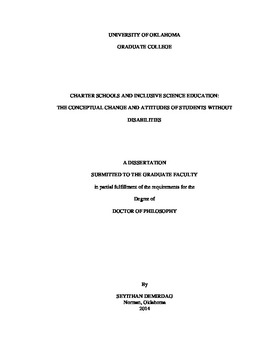| dc.contributor.advisor | Laubach, Timothy A. | |
| dc.contributor.author | Demirdag, Seyithan | |
| dc.date.accessioned | 2014-04-07T22:52:23Z | |
| dc.date.available | 2014-04-07T22:52:23Z | |
| dc.date.issued | 2014-03-06 | |
| dc.identifier.uri | https://hdl.handle.net/11244/8109 | |
| dc.description.abstract | As a philosophy and educational approach, inclusive education provides opportunities for all students to have effective conceptual understanding and positive social attitudes (Idol, 2006). With inclusion, educators incorporate students with disabilities into the regular classroom rather than exclude students from these environments (Norwich, 1999). Even though the centerpiece in inclusion is the academic development of all students (Dukes & Lamar- Dukes, 2006), the research literature mostly emphasizes the benefits of inclusion on students with disabilities and excludes their non-disabled peers.
The purpose of this study was to investigate the conceptual understanding and retention of students without disabilities and their attitudes towards students with disabilities in inclusive science classrooms at a charter middle school. This study included the collection and analysis of quantitative data using a non-equivalent quasi-experimental design to determine if students without disabilities in inclusive charter middle school science classrooms were positively or negatively affected by the process of being educated with their learning-disabled peers within inclusive science classrooms.
This study took place in a charter middle school in a large urban school district in a southwestern U.S. state. The participants of this study included 20 students without disabilities in two middle school science classrooms (one inclusive and one non-inclusive) per grade level (grades 6-8) with a total number of 120 students. The study included two science lessons on density, a density assessment tool, and an attitude measurement survey.
Analysis of the data occurred at three levels: (a) conceptual understanding, (b) conceptual retention, and (c) attitudes of students without disabilities toward students with learning disabilities. The study findings suggested that inclusive science education had a significantly positive effect on the conceptual understanding; a negative effect on conceptual retention; and a negative effect on the attitudes of students without disabilities towards their peers with disabilities in inclusive classrooms. | en_US |
| dc.language | en_US | en_US |
| dc.subject | Education, Curriculum and Instruction. | en_US |
| dc.subject | Education, Sciences. | en_US |
| dc.subject | Education, Special. | en_US |
| dc.title | CHARTER SCHOOLS AND INCLUSIVE SCIENCE EDUCATION: THE CONCEPTUAL CHANGE AND ATTITUDES OF STUDENTS WITHOUT DISABILITIES | en_US |
| dc.contributor.committeeMember | Marek, Edmund A | |
| dc.contributor.committeeMember | Houser, Neil O | |
| dc.contributor.committeeMember | Reeder, Stacy L | |
| dc.contributor.committeeMember | Lovett, David L. | |
| dc.date.manuscript | 2014-03-06 | |
| dc.thesis.degree | Ph.D. | en_US |
| ou.group | Jeannine Rainbolt College of Education::Department of Instructional Leadership and Academic Curriculum | |
